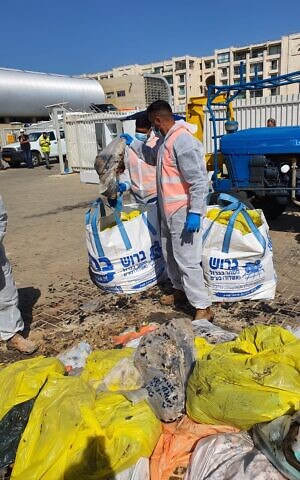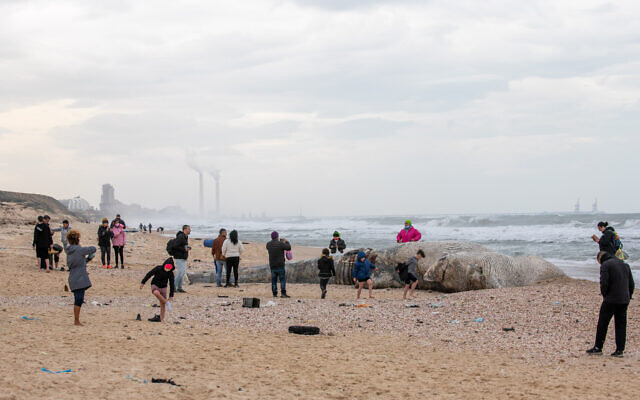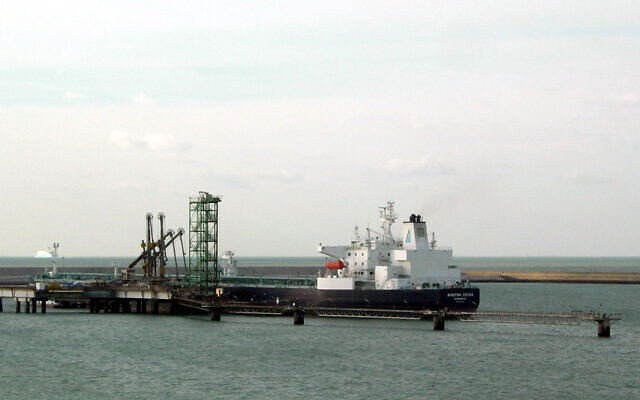The Environmental Protection Ministry launched a major operation on Wednesday to dispose of over a thousand tons of tar scraped so far from the country’s beaches in an ongoing cleanup following a huge spill that severely contaminated most of Israel’s Mediterranean coastline.
Some 1,200 tons of tar and contaminated waste will be taken to biological treatment facilities or appropriate landfill sites, the ministry said in a statement.
Thousands of volunteers have been cleaning tar off the beaches, assisted by organized groups from bodies such as the military and the police. The work is being coordinated with local authorities, the Israel Nature and Parks Authority, and the nonprofit Ecoocean marine protection group.
Tar has over the past several days washed up along 160 kilometers (100 miles) out of the country’s 195 kilometers of coastline, prompting the government to order Israelis away from the areas. The source of the spill is still under investigation.

The Environmental Protection Ministry clearing waste from Israel’s beaches following a major tar spill that contaminated the coastline, February 24, 2021. (Environmental Protection Ministry)
“We will restore clean and safe beaches to the public,” Environmental Protection Minister Gila Gamliel said in the statement.
The operation will be carried out by the ministry-run Environmental Services Company, which specializes in hazardous waste removal.
Over the past few days, numerous pictures have been posted on social media of tar-covered animals.
On Tuesday the government approved NIS 45 million ($13.8 million) for the cleanup operation. The cash is coming from the state’s Fund for the Prevention of Marine Pollution, created some 40 years ago to pay for cleanups as well as equipment and training to respond to oil spills.
תראו את התמונה שצילם עופר בהט. קומרן במעגן מיכאל, זפת על הכנפיים. בעלי החיים תמיד משלמים את מחיר מחדלי האנושות pic.twitter.com/xDFL8N3wwJ
— Shani Ashkenazi | שני אשכנזי ????????????????????♀️ (@ShaniAshkenazi) February 20, 2021
Israelis this week were told to stay away from the beaches all along the Mediterranean coast, from Rosh Hanikra in the north to Ashkelon in the south, after what some experts have called the worst environmental disaster to hit the country’s beaches in decades.
No official estimate has yet been provided regarding when the beaches will again be deemed safe.
???? סיור בוקר בחופי אכזיב וראש הנקרה, של רני עמיר, מנהל היחידה הארצית להגנת הסביבה הימית של המשרד להגנת הסביבה.
ממשיכים במאמץ הלאומי לנקות את הים והחופים.
אנחנו ועמותת אקואושן מדריכים את המתנדבים ומספקים ציוד מתאים. להרשמה לניקיונות: https://t.co/sgtWtYMWJq pic.twitter.com/3DODGybtIJ— המשרד להגנת הסביבה – Environmental Protection (@SvivaMinistry) February 23, 2021
Reports of the pollution emerged last Thursday when a dead 17-meter baby fin whale washed up on Israel’s southern coast, along with other wildlife.

Israelis stand around a 17-meter fin whale washed ashore on the Nitzanim beach, near the city of Ashkelon, February 19, 2021. (Photo by Yossi Aloni/Flash90)
The cleanup came as operators of a Greek-flagged ship on Wednesday rejected Israeli media reports suggesting the vessel was the cause of the tar spill.
A gag order on the investigation into the probe was partially lifted Tuesday, with the Haifa Magistrate’s Court issuing a much-reduced set of instructions.
Referring to what they called “the unfounded and inaccurate allegation posted in the media” operators of the Minerva Helen told The Times of Israel in an email that the ship was empty of any cargo when it was recently in the area where the suspected spill began.
Operators said they will “cooperate with any relevant authority in relation” to the incident and provided a history of the ship’s movements during the relevant period.

The Minerva Helen crude oil tanker, seen at the oil terminal of Dunkirk, France. (Remi Jouan, CC BY-SA 3.0, Wikimedia Commons)
From February 4 until February 11 the ship “was drifting offshore Port Said, Egypt, awaiting voyage orders in empty condition, without any cargo on board,” operators said.
“Drifting while awaiting orders is a routine practice for commercial vessels,” the email stressed.
On February 11 the ship moved to Port Said Anchorage, “where she arrived in the afternoon remaining without any cargo on board.” From there the ship traveled on February 13 to Sidi Kerir port, Egypt, where it took on cargo and then sailed directly to Cartagena Spain on February 15, the email said.
“During the period that the vessel was drifting offshore Port Said awaiting her next employment, the vessel was not involved in any operation nor in any other activity that could be connected to an oil discharge at sea,” the email said. It noted, “it is well maintained without any structural or other defects that could cause an oil pollution incident.”
Operators added that on February 22 the ship was inspected by Spanish authorities and found to be sound.
Sue Surkes contributed to this report.
 RSS Feed
RSS Feed















 February 24th, 2021
February 24th, 2021  Awake Goy
Awake Goy  Posted in
Posted in  Tags:
Tags: 













